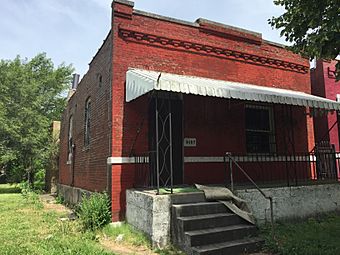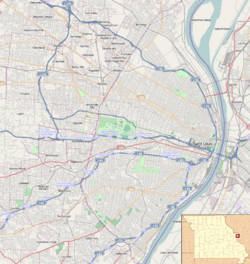Chuck Berry House facts for kids
Quick facts for kids |
|
|
Chuck Berry House
|
|

Chuck Berry House in 2017
|
|
| Location | 3137 Whittier Street, St. Louis, Missouri |
|---|---|
| Built | 1910 |
| Architect | William Moxey and James Podmore |
| Architectural style | Shaped-parapet single-family |
| NRHP reference No. | 08001179 |
| Added to NRHP | 2008 |
The Chuck Berry House is a special home in St. Louis, Missouri. It was once owned by the legendary rock and roll musician, Chuck Berry. This house, located at 3137 Whittier Street, is where Chuck Berry lived when he wrote and first performed many of his most famous songs. These include hits like "Maybellene" (1955), "Roll Over Beethoven" (1956), "Rock and Roll Music" (1957), and "Johnny B. Goode" (1958).
What the House Looks Like
This house was built in 1910. It is located in an older part of north St. Louis called the Greater Ville. The house is currently empty, but it still looks much like it did when Chuck Berry lived there. For example, it has an awning on the front porch with a letter "B" for Berry.
The house sits on a narrow piece of land. It is built very close to other similar houses. The outside is made of red brick. However, Chuck Berry added a small concrete-block room to the back in 1956. He did this to make more space for his growing family. It also gave him more room for practicing his music.
Inside, the house still has its original floor plan. You can see the old hardwood floors, plaster walls, doors, and light fixtures. The kitchen was updated in the late 1950s. Later, a metal front door and metal window grilles were put in. Other than these changes, the house looks much like it did when Berry lived there.
In 2008, the Chuck Berry House was added to the National Register of Historic Places. This is a list of important historical places in the United States. It was unusual for a house to be added to this list while the person it was connected to was still alive.
Chuck Berry's Time in the House
Chuck Berry and his wife, Thelmetta, moved into this house in 1950. They lived there for eight years. This house was Chuck Berry's home during the most important part of his music career. It is considered the most significant place linked to him.



